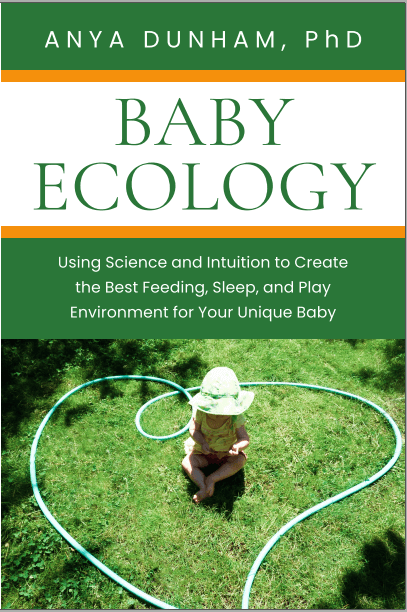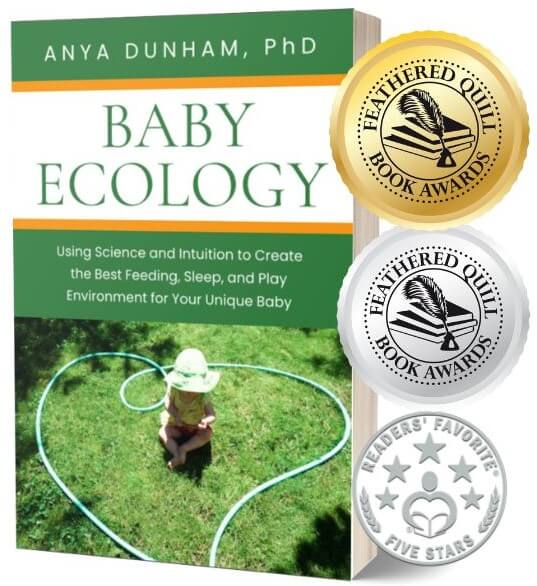Baby Ecology book is here! Learn more
Baby Ecology book is here!
- Home
- Baby activities
The best baby activities are… not really activities
by Anya Dunham, PhD
Discover five baby activities that best support your baby's learning (they might not be what you think they are!)
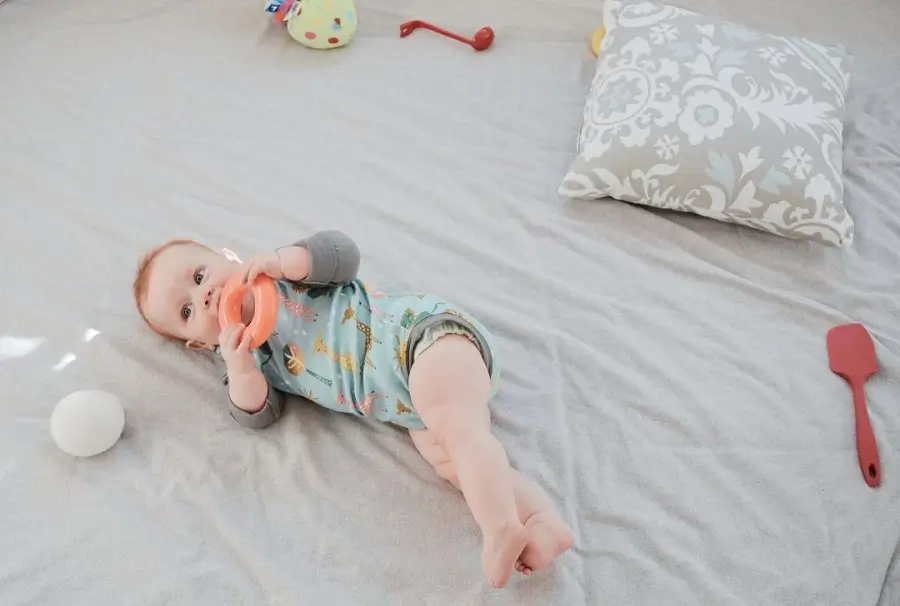
I write this is early 2022, and in our part of the world it's now once again possible to go to the public pool, library, indoor playgrounds, and parent-and-baby classes and socializing groups. Whether you are reading it as we come out of the global pandemic or later on when (I hope) the pandemic is way behind us, you might be wondering what activities are best to do with your baby.
Why do we want to take our babies to various activities and places? I would guess that for most parents the answer is, “to help my baby learn and socialize”. (Especially if baby was born during the pandemic). Other answers I’ve heard are, "to help with separation anxiety" and “to prepare my baby for preschool”. And, of course, that makes sense, at least on the surface. But let’s take a closer look.
A "prepared" childhood
The way society sees babies and children is changing. Only a few decades ago many parents believed that responding to babies quickly and holding them a lot would make them grow into ungrateful, manipulative, spoiled children.1 Fortunately, we now know enough about child development to be confident that our attention absolutely does not “spoil” babies. Babies never manipulate us, but communicate their needs and feelings. Our sensitive and mind-minded responses are vital for our babies’ development: they strengthen attachment, help develop trust, allow babies to learn, and help them regulate emotions – during babyhood and beyond.
This could have surprised your grandparents back in the day, but I bet it doesn’t surprise you or most young parents you know (and that’s really great!). But now another narrative is emerging: that we must take advantage of the early windows of opportunity and enhance our babies’ development before it’s too late.
In addition to the “protected” vision of childhood that focuses on the child’s well-being in the moment, the “prepared” vision concentrates on the future: preparing children for success in adult life.2 This “prepared” vision has inspired a multitude of educational toys and baby activities and enrichment classes:
- Electronic toys and apps immerse babies in music and foreign languages
- Flash cards provide stimulation
- Baby toy subscription boxes abound
- Lessons such as “multi-sport class for babies as young as four months” and “infant aquatics” are readily available
- Extra equipment designed specifically for babies, like playroom mirrors, screen holders for strollers, and entertainment centers for baby chairs is gaining popularity
Do these baby activities and toys truly prepare our littles for a better future?
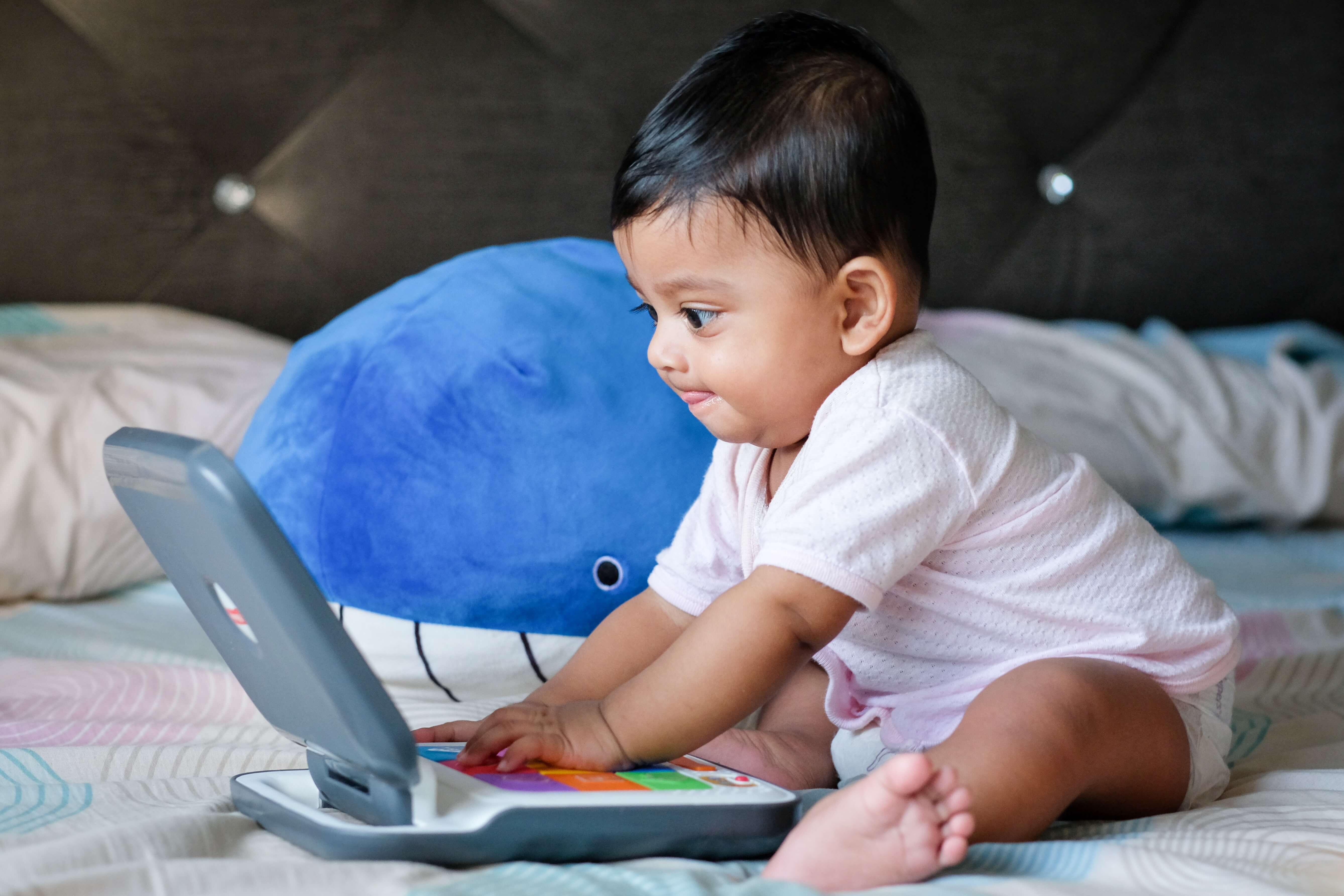
Helping babies learn
Looking closely at the science of infant development has made it clear to me: during the early months, protecting is preparing. Protecting babies from overtiredness, too much stimulation, and too fast of a pace allows for the natural, gradual development of their identity, well-being, creativity, and strength. And it has to do with how babies learn.
Babies learn by figuring out patterns
At the core of any learning is the ability to notice something, separate it from everything else, make sense of it, and store it in memory. As babies notice what is happening around them, their brains look for patterns and make mental maps: “When I see this happen, I can expect that.” They also look for surprise events that don’t fit into the patterns they learned previously.3 For example, by about five months babies learn that objects that are dropped usually fall down4 and may be surprised to see a balloon floating in the air.
In my book, Baby Ecology, and in this article (one of my favourite ones!), I describe the science behind the five elements that help babies learn best:
Sound sleep helps baby stay calm and regulated when he’s awake so he can detect new things around him; when he goes to sleep again, his experiences are integrated into memory.5,6 Avoiding overstimulation — less background noise, less unnatural movement, less visual clutter — helps baby separate new sounds, sensations, and sights from everything else and make sense of them.7
Babies accumulate their observations and figure out patterns naturally, but it’s easier for them to do so in stable, predictable environments where they see the laws of physics and experience the patterns of human relationships over and over.
Last but not least, babies benefit from interacting with supportive adults and from exploring safely and freely on their own. Positive interactions help babies learn new actions and words, especially when adults actively support what babies are interested in. When moms routinely play with their babies in a positive but less stimulating way (allowing babies to lead and not tickling or excessively repositioning them), babies show neural activity indicative of stronger early brain development.8 Exploring new things safely and freely on their own — for example, manipulating toys and play objects with different textures, weights, and shapes or simply watching natural events like a ray of sunlight travelling across the carpet — helps babies understand the world around them and develop mastery for more goal-directed play in later years.9
The best baby activities to support learning
The good news is, the five elements babies need most for learning can be easily found in your home, backyard, or local park! In fact, all of them may be easier for you to create – and for your baby to experience - in and around your home.
Here are five great "baby activities" to support your baby’s learning:
- Help your baby sleep soundly
- Make your home a calmer, more predictable, more natural space (for example, consider reducing screen time including background TV)
- Slow down and be sensitive and mind-minded during daily care routines such as diapering, bathing, and feeding
- Play with your baby: respond to baby-initiated “conversations” and curiosity, sing, play games such as peekaboo, pat-a-cake, rolling a ball, blowing bubbles, puppet shows, and building block towers; read with your baby; follow your baby’s interests and his or her lead in choosing play objects and activities.
- Create a 100% safe play area where your baby can explore freely on their own
Of course, an outing to the pool or a busy playground can be fun for you and your baby. But I want you to know that if you are not able to do these activities or not comfortable doing them right now, for any reason, your baby will still find plenty of opportunities to learn, connect, and grow in your loving home.
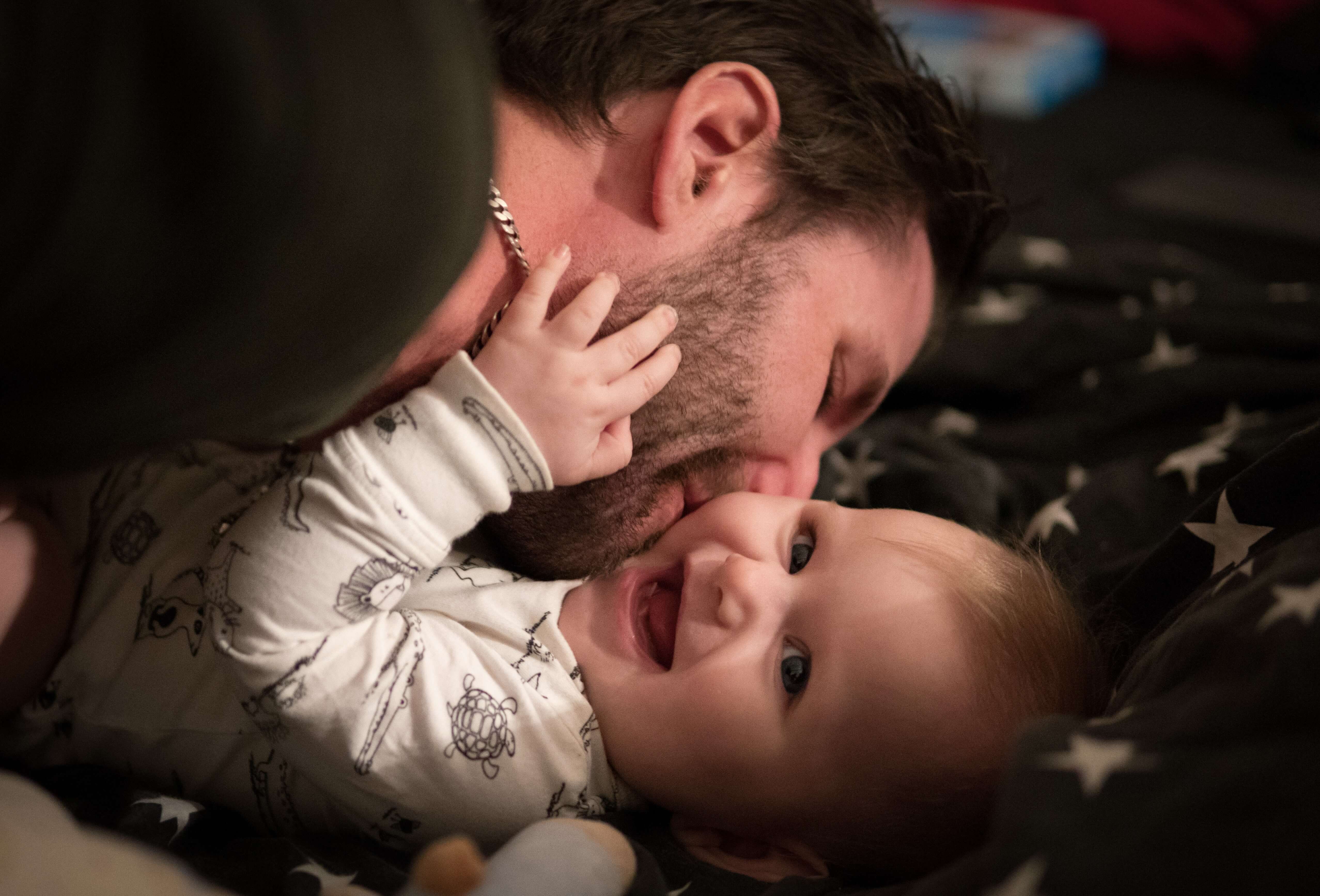
(If your baby is going to attend daycare, look for similar 'baby activities' there - here is a free PDF guide to help you choose the best daycare for your baby.)
You might also be interested in:
References
References
1. Solomon R, Martin K, Cottington E (1993) Spoiling an infant: further support for the construct. Topics in Early Childhood Special Education 13(2): 175-183
2. Mintz S (2004) Huck's raft: a history of American childhood. Harvard University Press, Cambridge, MA, USA
3. Marcus GF et al (1999) Rule learning by seven-month-old infants. Science 283(5398): 77-80
4. Needham A, Baillargeon R (1993) Intuitions about support in 4.5-month-old infants. Cognition 47(2): 121-148
5. Rauchs G et al (2008) Sleep modulates the neural substrates of both spatial and contextual memory consolidation. PLoS One 3(8): e2949
6. Horváth K et al (2018) Memory in 3-month-old infants benefits from a short nap. Developmental Science 21(3): e12587
7. Marshall J (2011) Infant neurosensory development: considerations for infant child care. Early Childhood Education Journal 39(3): 175-181
8. Bernier A, Calkins SD, Bell MA (2016) Longitudinal associations between the quality of mother-infant interactions and brain development across infancy. Child Development 87(4): 1159-1174
9. Messer DJ (2002) Mastery motivation: an introduction to theories and issues. Pp 13-28 in: Mastery motivation in early childhood (ed Messer DJ). Routledge, London, UK
Using hundreds of scientific studies, Baby Ecology connects the dots to help you create the best environment for sleep, feeding, care, and play for your baby.
Warmly,
Anya
